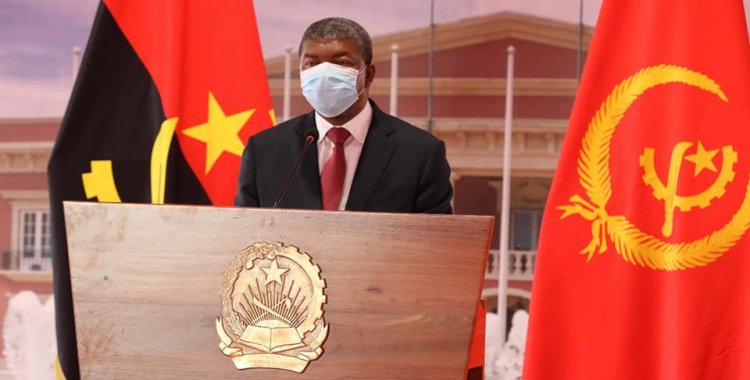"This is not the time for us to point fingers looking for the guilty. It is important that each one assumes his or her share of responsibility. It is thus that, imbued with this spirit, we have come to the victims of the conflicts and to Angolans in general to humbly request, on behalf of the Angolan State, our public apologies for the great evil that was the summary executions at that time and under those circumstances," said the head of the executive.
João Lourenço was addressing the country in a communication broadcast by Angola's Public Television, on the eve of the date of the alleged coup of May 27, 1977, which will be marked for the first time with a tribute in memory of the victims.
"The public apology and pardon is not just simple words and reflects a sincere repentance and willingness to put an end to the anguish that these families carry due to lack of information regarding their loved ones," he added.
The apology was a complaint from survivors and organizations representing the victims and their descendants, grouped in the May 27 Platform.
The Chief Executive also announced that on Thursday will begin the process of delivering the first death certificates to family members, and in the coming days will begin the process of locating the remains and bones of prominent figures involved in the alleged coup attempt, such as Nito Alves, Sita Vales, José Van Dunem, former military and other victims of the 27 of May, for exhumation and delivery to family members.
The bones of Jeremias Chitunda (vice-president of the National Union for Total Independence of Angola, opposition) and others fallen in combat in the 1992 post-electoral conflict in the city of Luanda will also be delivered.
João Lourenço admitted that, due to the time elapsed, it may not be possible to locate all the victims, but assured that all efforts will be made so that the families can hold a dignified funeral and asked for everyone's understanding for cases in which it is not possible to achieve this goal.
"We believe that this gesture loaded with emotion and great symbolism provides a great relief to the families of the victims, but also to the Angolan State that, through its Executive, decided to break a silence of more than four decades," stressed the President, indicating that in the coming days excavations will begin to materialize what was announced.
João Lourenço recalled the tragic events that mourned the country in 1977, at a time when two years had passed since the proclamation of national independence and when "nobody imagined that the internal divisions of the liberation movements would be carried to the interior of the country in the post-independence period and with such tragic consequences that have left deep wounds in the hearts of Angolans".
He recalled that at that time "a group of citizens carried out a frustrated coup attempt, killing high figures of the ruling power", especially the then Finance Minister, Saidy Vieira Dias Mingas, and acknowledged that the reaction of the authorities of the time was "disproportionate and taken to the extreme, having carried out summary executions of an undetermined number of Angolans, many of them innocent".
For João Lourenço, the position of a State "should be pondered and measured by the responsibilities it has in the defense of the Constitution, of the law and of human life".
He stressed that Angola has played in recent years a conciliatory and appeasing role in internal conflicts in the region and that it is important to work continuously to heal its own wounds, having started a process of reconciliation and created in that context the CIVICOP (Commission of Reconciliation in Memory of Victims of Political Conflicts).
"At that time it seemed to be more of a cosmetic exercise that had no clear goal to achieve, but little by little the skepticism of many gave way to hope that the process was serious. Today we can say that trust has overcome scepticism and that the success of the commission encouraged the head of state to take this step," he considered.
He encouraged all the other actors and participants in the conflicts to do the same, and stressed that "history cannot be erased" and that "the truth of the facts must be assumed so that societies take preventive measures to avoid the repetition of similar tragedies.
He also alluded to the victims of other events such as the women of the Jamba fires, passengers of the Zenza do Itombe train, and the martyrs of Kuito and Huambo, showing himself convinced that "with this gesture, the souls of the victims of political conflicts will have the peace necessary for eternal rest," in a turn of the page that leads to the reconciliation of Angolans regardless of party colors.
On May 27, 1977, an alleged coup attempt, an operation led by Nito Alves - then former Minister of Interior from independence (November 11, 1975) until October 1976 - was violently repressed by Agostinho Neto's regime.
Six days earlier, on May 21, the Popular Movement for the Liberation of Angola (MLPA, in power) had expelled Nito Alves from the party, which led the former minister and several supporters to invade the Luanda prison to release other sympathizers, taking control of the national radio station at the same time, a move that became known as "fractionism.
The troops loyal to Agostinho Neto, with support from Cuban military, eventually established order and arrested the insurgents, followed, then what became known as "purge", with the elimination of factions, having been killed about 30 thousand people, mostly without any connection to Nito Alves, as stated by Amnesty International in several reports on the subject.
In April 2019, the President ordered the creation of a commission (the CIVICOP), to draw up a general plan to honor the victims of the political conflicts that occurred in Angola between November 11, 1975 and April 4, 2002 (end of the civil war).







